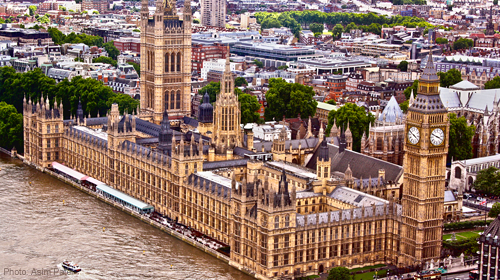
The First Amendment may be on shaky ground here in the United States, but at least most folks, on both the left and right, agree that freedom of the press is a good thing ‚Äď or, at least, a necessary evil.
Not so much across the pond. This week, the British Parliament's Home Affairs Select Committee that Alan Rusbridger, editor of the Guardian newspaper, explain why he's not a traitor. The Guardian was the first outlet to publish stories based on the Snowden documents, exposing the mass surveillance activities of both the U.S. and U.K. signals intelligence agencies.
At times, the questioning . A couple of lowlights.
"You and I were both born outside this country, but I love this country. Do you love this country?" asked Keith Vaz, committee chair. Rusbridger, to his significant credit, kept a cool head throughout. "I'm slightly surprised to be asked the question," he responded, "but, yes, we are patriots and one of the things we are patriotic about is the nature of democracy, the nature of the free press and the fact that one can, in this country, discuss and report these things."
The aptly named Mark Reckless, Conservative MP for Rochester and Strood, stated bluntly that Rusbridger had "committed a criminal offence" in reporting on the Snowden documents and sharing them with other journalists, and asked if the matter should be referred to crown prosecutors.
Rusbridger, in response, had to explain press freedoms 101. "I think it depends on your view of a free press," he said. "In America, the attorney general has said . . . that . . . he had no intention of prosecuting Glenn Greenwald [the journalist who first reported the Snowden story] . . . He said that under his watch he will not prosecute any journalist doing their duty."
Here in the United States, journalists haven't been dragged in to testify before Congress for publicizing the Snowden documents. But we too have seen a worrying increase in assaults on press freedoms, prompting the Committee for Protection of Journalists to recently issue a scathing report decrying the Obama administration's unprecedented "war on leaks and other efforts to control information." In that environment, it's no surprise that at least one member of Congress, and, shockingly, even some members of the media, for the prosecution of Glenn Greenwald, who wrote many of the Guardian articles.
The country that produced both the Guardian and Home Affairs Select Committee also produced the Areopagitica, John Milton's 1644 seminal defense of freedom of the press. Although largely an argument against "prior restraint" through the licensing of printers, Milton's pamphlet also highlighted the ultimate danger of a hearing such as yesterday's, in which MPs urged criminal penalties for the simple publication of facts that are undoubtedly in the public interest.
"[E]rrors in a good government and in a bad are equally almost incident," Milton wrote, "for what Magistrate may not be mis-inform'd, and much the sooner, if liberty of Printing be reduc't into the power of the few." In other words, government is inherently fallible, even one acting with the best of intentions. Reducing the ability of the public to uncover and report on that fallibility through government control of the press, leads to public ignorance, poor policy outcomes and a fundamental loss of individual liberty.
Although Congress hasn't subpoenaed the New York Times or Washington Post (yet), the spectacle at Westminster yesterday should have us all concerned. Rusbridger was called to task for, and asked to defend, basic principles of Anglo-American governance. Worse, he had to do so in front of the very people who should be doing the defending.
Once a reporter has received information in the public interest (subject to the narrowest of exceptions), that information must be allowed to be reported without limitation and at the discretion of the journalist. Only through this freedom can we hold our public servants to account for their actions, good or bad. In Britain, to their shame, these servants seem to have forgotten whom they serve.
Learn more about freedom of the press and other civil liberty issues: Sign up for breaking news alerts, , and .

